Newsニュース
Japan-Sweden Symposium on Post COP26 Industrial Transformation: Circular Economy as a Driver for Competitiveness
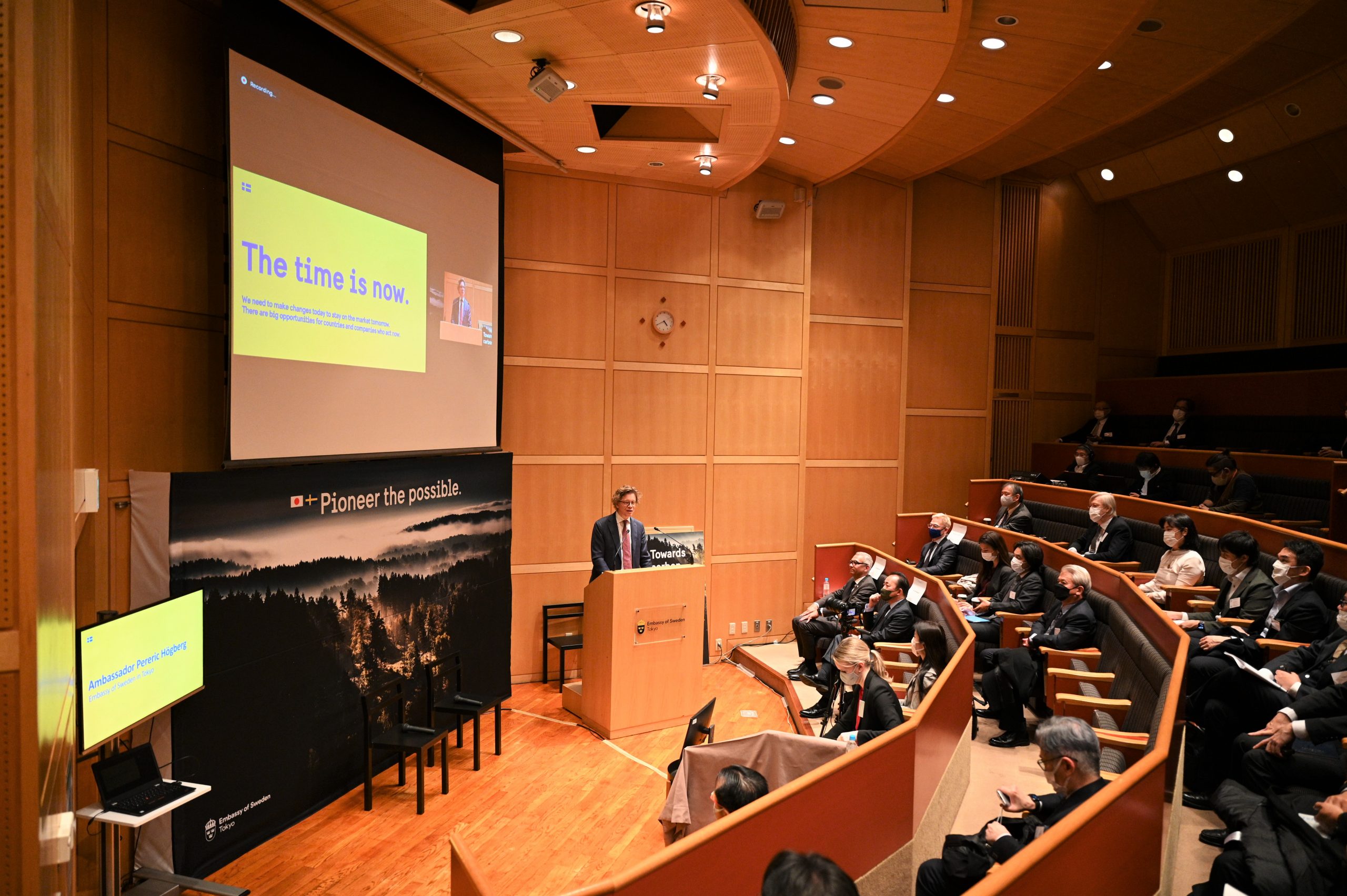
On Wednesday, December 15th, Japan Innovation Network, the Embassy of Sweden in Tokyo, Research Institutes of Sweden (RISE) and Business Sweden, held a joint symposium attended by over 200 people remotely and in person at the Swedish Embassy.
・The Swedish Embassy’s Auditorium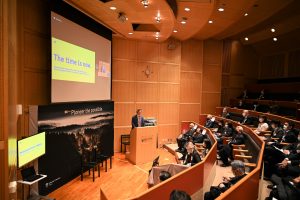 The symposium was opened by the Ambassador of Sweden to Japan, Pereric Högberg. Ambassador Högberg shared his inspiring perspective on how the rapid changes and issues that our world is facing can be turned into opportunities provided that we act right, and that countries, such as Sweden and Japan, collaborate in driving the transformation:
The symposium was opened by the Ambassador of Sweden to Japan, Pereric Högberg. Ambassador Högberg shared his inspiring perspective on how the rapid changes and issues that our world is facing can be turned into opportunities provided that we act right, and that countries, such as Sweden and Japan, collaborate in driving the transformation:
“Our global challenges are possibilities. The glass is not half-empty, it is half-full! With more research, with more science, with more innovation, with more forward-leaning companies, we can see the future in a bright way. Japan and Sweden can do this together.”
・Pereric Högberg, Ambassador of Sweden to Japan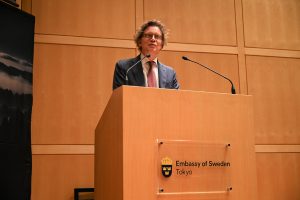 The second introduction speech was delivered by Hiro Nishiguchi, CEO of Japan Innovation Network and Chairperson of Japan’s mirror committee for ISO’s Technical Committee 279 on Innovation Management. Mr. Nishiguchi shared his first-hand experience in collaborating with Sweden and his conviction of the country’s exceptional capacity and achievements in the field of innovation, IMS and sustainability.
The second introduction speech was delivered by Hiro Nishiguchi, CEO of Japan Innovation Network and Chairperson of Japan’s mirror committee for ISO’s Technical Committee 279 on Innovation Management. Mr. Nishiguchi shared his first-hand experience in collaborating with Sweden and his conviction of the country’s exceptional capacity and achievements in the field of innovation, IMS and sustainability.
“Sweden is a leading nation for both innovation and the SDGs. It understands the concept of IMS at both the national level and the corporate level and has been working not only from individual efforts but also with a system approach. Let’s learn from them and work together!”
・Mr. Hiro Nishiguchi, CEO of Japan Innovation Network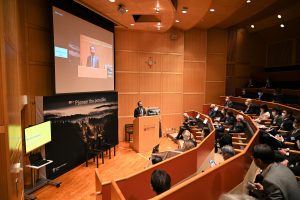 These introductory speeches were followed by a comprehensive presentation by Shinichi Kihara, Deputy Director-General of Japan’s METI (Ministry of Economy, Trade, and Industry), on METI’s Green Growth Strategy and Green Innovation Fund that were developed this year. Besides highlighting the “revolutionary” and “ambitious” policy-making that have been put forward by the Japanese government to realize a decarbonized economy, he emphasized the obvious synergies and joint potential that the two nations share:
These introductory speeches were followed by a comprehensive presentation by Shinichi Kihara, Deputy Director-General of Japan’s METI (Ministry of Economy, Trade, and Industry), on METI’s Green Growth Strategy and Green Innovation Fund that were developed this year. Besides highlighting the “revolutionary” and “ambitious” policy-making that have been put forward by the Japanese government to realize a decarbonized economy, he emphasized the obvious synergies and joint potential that the two nations share:
“Both countries respect sophisticated technology and innovation, which have always functioned as strong engines for growth in both nations. Today, given the pressing need of addressing climate change and sustainable growth, Sweden and Japan are the perfect match to find solutions to our global agenda. These are difficult challenges for human beings, and it is essential to bring together the wisdom of the world, to discover solutions, and open-up new futures. “
・Mr. Shinichi Kihara, Deputy Director-General of Japan’s METI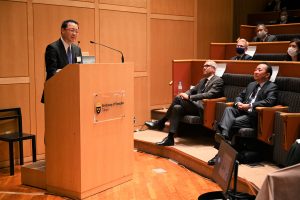 Subsequently, distinguished innovation leaders and experts from Sweden shared their insights on the topic of “circular economy as a driver for competitiveness”.
Subsequently, distinguished innovation leaders and experts from Sweden shared their insights on the topic of “circular economy as a driver for competitiveness”.
Dr. Peter Alberius, Head of International Business Development for RISE, introduced his organization to the audience, which spearheads innovation in Sweden as the key national institution in that matter, but also internationally with a third of its activities being global.
His colleague, Dr. Johanna Mossberg, Head of Department for Biorefinery and Energy, then shared a thought-provoking presentation on the future of Carbon Economy and Carbon Utilization (CCU), and biorefineries as drivers for an economy “where everything that can be made from fossil fuels, [becomes] bio-based”
・Dr. Peter Alberius and Dr. Johanna Mossberg from RISE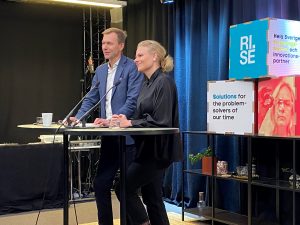 These were followed by two business case studies from Sweden. First, the scale-up company Liquid Wind, represented by Mr. Jesper Engstrand, shared its solution for a carbon-neutral fuel, eMethanol, which is produced combining renewable energy with upcycle carbon dioxide, and its potential for the Japanese Industry. Then, Ms. Ingrid Karlsson, representing Northvolt, a Swedish green battery unicorn, explained the company’s background and mission, and how by using 100% renewable energy and 50% recycled material in its manufacturing process, it was aiming to produce “the world greenest battery and closing the loop in the battery value-chain”.
These were followed by two business case studies from Sweden. First, the scale-up company Liquid Wind, represented by Mr. Jesper Engstrand, shared its solution for a carbon-neutral fuel, eMethanol, which is produced combining renewable energy with upcycle carbon dioxide, and its potential for the Japanese Industry. Then, Ms. Ingrid Karlsson, representing Northvolt, a Swedish green battery unicorn, explained the company’s background and mission, and how by using 100% renewable energy and 50% recycled material in its manufacturing process, it was aiming to produce “the world greenest battery and closing the loop in the battery value-chain”.
・Ms. Ingrid Karlsson from Northvolt, and Mr. Jesper Engstrand from Liquid Wind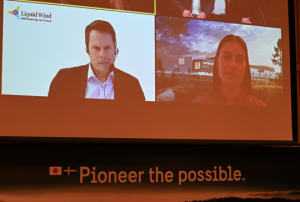 The panel discussion, led by Hiro Nishiguchi, saw active participation from all participants who all shared a common vision on the tight interconnection and nexus between sustainability, competitiveness, and collaboration in our challenges-fraught and fast-changing world:
The panel discussion, led by Hiro Nishiguchi, saw active participation from all participants who all shared a common vision on the tight interconnection and nexus between sustainability, competitiveness, and collaboration in our challenges-fraught and fast-changing world:
For example, Dr. Peter Alberius highlighted that “What is at stake is not only the survival of the planet but also the survival of Swedish and global industries. Science and technology can solve critical issues, while at the same time building businesses for the future”
Dr. Johanna Mossberg concurred that: “For a fast transition, we need to connect the competencies and resources between a variety of actors. (…) Connecting these different value chains is key to sustainability.”
・The panel discussion moderated by Hiro Nishiguchi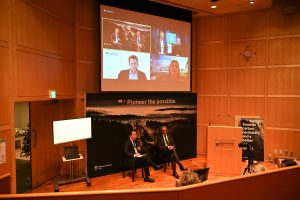 In his wrap-up remarks, Carsten Grönblad, Sweden’s Trade Commissioner to Japan, shared this vision expressed by the panelists:
In his wrap-up remarks, Carsten Grönblad, Sweden’s Trade Commissioner to Japan, shared this vision expressed by the panelists:
“The competitive space has moved from inside the company, where it used to be how efficient and lean you can be, to outside the company, and how you can create platforms with valuable partners. (..) If you innovate with a purpose, you will have a sustainable business idea that is profitable, and ensure that you actually meet the demand, and address societal needs.”
・Mr. Carsten Grönblad, Sweden’s Trade Commissioner to Japan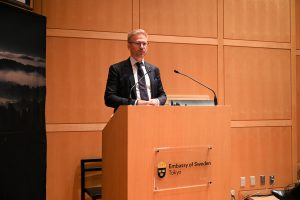 Dr. Michael Jacob, Science and Innovation Counsellor at the Embassy of Sweden in Tokyo, acted as the Master of Ceremony for the symposium and closed the session with the optimistic words: “We have a lot of possibilities together. Sweden and Japan can co-create in pioneering the possible, for a future sustainable world!”
Dr. Michael Jacob, Science and Innovation Counsellor at the Embassy of Sweden in Tokyo, acted as the Master of Ceremony for the symposium and closed the session with the optimistic words: “We have a lot of possibilities together. Sweden and Japan can co-create in pioneering the possible, for a future sustainable world!”
・Dr. Michael Jacob, Science and Innovation Counsellor at the Embassy of Sweden in Tokyo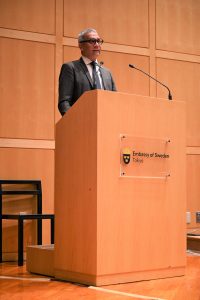 The symposium was followed by a reception at the Ambassador’s residence, to which all in-person guests were kindly invited and could enjoy the delights of Swedish traditional drinks and gastronomy and have further exchanges on various topics with the symposium panelists, joining the reception from Sweden through virtual booths.
The symposium was followed by a reception at the Ambassador’s residence, to which all in-person guests were kindly invited and could enjoy the delights of Swedish traditional drinks and gastronomy and have further exchanges on various topics with the symposium panelists, joining the reception from Sweden through virtual booths.
・Reception at the Ambassador’s residence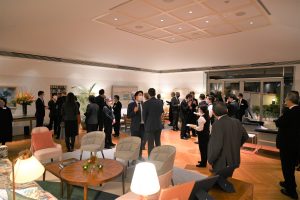 ・Ambassador Pereric Högberg and Mr. Hiro Nishiguchi exchanging views with Dr. Peter Alberius and Dr. Johanna Mossberg through the virtual booth
・Ambassador Pereric Högberg and Mr. Hiro Nishiguchi exchanging views with Dr. Peter Alberius and Dr. Johanna Mossberg through the virtual booth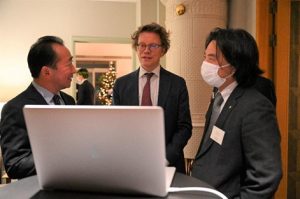 Japan Innovation Network would like to express its warm gratitude to all the stakeholders involved in the success of this event.
Japan Innovation Network would like to express its warm gratitude to all the stakeholders involved in the success of this event.
We hope this symposium will be a valuable step in Japan and Sweden’s journey toward collaboration for innovation, industrial transformation, competitiveness, and sustainability!
* All pictures shared in this Event Report are copyrighted by Hiromi Johansson/Embassy of Sweden in Tokyo
